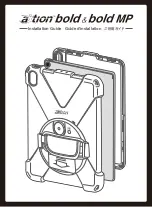
(15189) Precipitation Sensor
Operating Instructions
Operating Instruction
Precipitation Sensors (15189) + (15189 H)
Installation
Mounting of the sensor
The
precipitation sensor (15189)
must be mounted on a tube
or pole with an outside diameter of 60 mm. A metallic exten-
sion tube with a minimum length of 100 mm is recommended,
if a wooden pole is used.
For easy adjustment place a spirit-level on the upper measur-
ing edge.
Attention! Do not damage the measuring edge!
Place the
precipitation sensor (15189)
on the end of the pole
until it
fi
ts in. By using the provided allen key (4 mm) , tighten
the screws in the mounting pedestal evenly. Adjust the upper
measurement edge to an exact horizontal position. By doing
this, the tipping bucket will automatically be positioned verti-
cally inside the device and will works symmetrically.
Dismounting of the protective covering
Loosening the screw with the provided 3 mm allen key until
the protective covering can be turned right to the stop position
and take off upward then.
Assembly of the Tipping bucket
To avoid damage to the tipping bucket during trans-
port, it is separately packed and should be inserted
in the precipitation sensor (15189)
on site only after
mounting the gauge on the mast.
For the assembly
fi
rst you must remove the protec-
tive covering.
Attention!
When fitting the tipping bucket, proceed with
utmost caution so that the sharp edges of the tip-
ping bucket are not damaged and the middle wall
is not bent!
During operation the tipping bucket lies on the precision
bucket bearings. To reduce the friction the bearings are made
of abrasion-resistant delrin.
The mounted tipping bucket is secured against eventual
changes of position by means of two plates.
To insert the tipping bucket,
fi
rst the relocatable locking plate
C
must be pushed back.
Now insert the tipping bucket
F
. Make sure that the magnet
E
attached at the middle wall of the tipping bucket rests under
the capsule with the embedded reed contact
D
.
Finally the tipping bucket must be secured by pushing back
the relocatable locking plate
C
.
Function
The weighing precipitation sensor (15189) measures the rain
quantity by a tipping bucket developed by Joss-Tognini, the
bearings of which have been arranged for low friction. Errors
that normally occur due to incomplete draining because of
surface tension are automatically compensated by the speci
fi
c
form of the tipping bucket.
The tipping bucket can hold 2 cm³ (2 g) resp. 4 cm³ (4 g) of
water. The collecting surface of 200 cm² (WMO standard)
means that one bucket charge is equivalent to a precipitation
rate of 0.1 mm resp. 0.2 mm per square meter.
If the bucket is tipped, the reed contact that is integrated in
the sensor will be closed. This pulse output can be electrically
scanned, remotely transmitted and recorded.
A bounce-free signal can be achieved by using the correspond-
ing electrically connection. Otherwise the signal of the reed
contact can be used directly, not bounce-free, if this func-
tion will be carried out by an appropriate data logger (e. g.
TROPOS).
The precipitation sensor (15189) is mounted on a pedestal
that is equipped with a connection piece and are attached to
a tube with an outside diameter of 60 mm.
For application in snowfall regions the heater equipped model
(15189 H) ensures all-year-round measurement. Two separate
controlled heating circuits with lowest hysteresis are providing
an optimal temperature at which snowing up of the sensor
will normally be prevented and evaporation from the heated
surfaces will be minimized.
The precipitation sensor (15189) is made of weather-resistant
aluminium and stainless steel. This ensures a long durabil-
ity.
These high-tech precipitation sensors comply with the regula-
tions WMO.
Dimensional Drawing
2


























